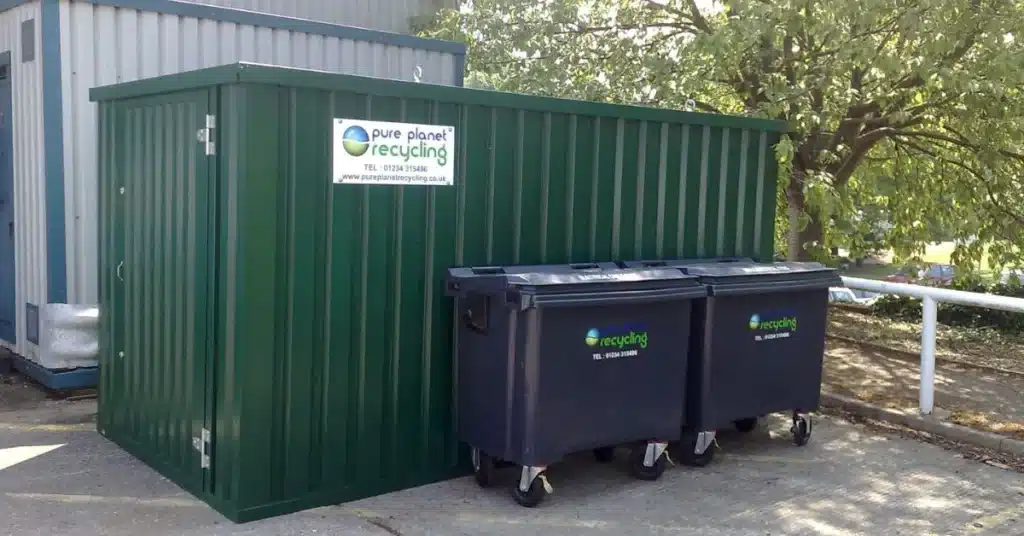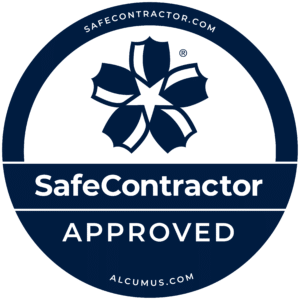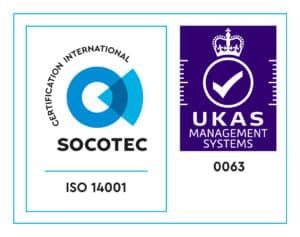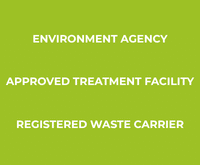Waste theft isn’t something most businesses think about until it happens. Yet across the UK, theft from bins, skips, and recycling areas is increasing every year. From stolen metals to data-bearing IT equipment, thieves keep finding new ways to profit from waste.
At Pure Planet Recycling, we’ve seen the problem first-hand. Some of our customers have had their waste bins stolen overnight. In another case, thieves cut away fridge compressors before our collection team arrived. We’ve even turned up to charge an electric vehicle only to find the charging cables missing.
These examples show how determined and opportunistic waste thieves can be. Any business, large or small, can be targeted. However, by putting a few precautions in place, you can protect your waste and manage it responsibly.
Why Waste Theft Happens
Waste theft usually happens for one simple reason: value. Many waste materials can be reused, resold, or stripped for metals such as copper and aluminium.
For example:
- Metals and cables can be sold as scrap.
- Electrical items can be refurbished and sold online.
- Bins and skips can be stolen and used illegally for fly-tipping.
When waste is left unsecured, it becomes an easy target. Opportunists often act within minutes. In one real example, a customer had fridges ready for collection, but an unverified driver turned up first and took them away. No one checked credentials or licences, and the business had to report the loss.
This kind of theft causes more than just inconvenience. It leads to compliance problems, environmental issues, and reputational harm.

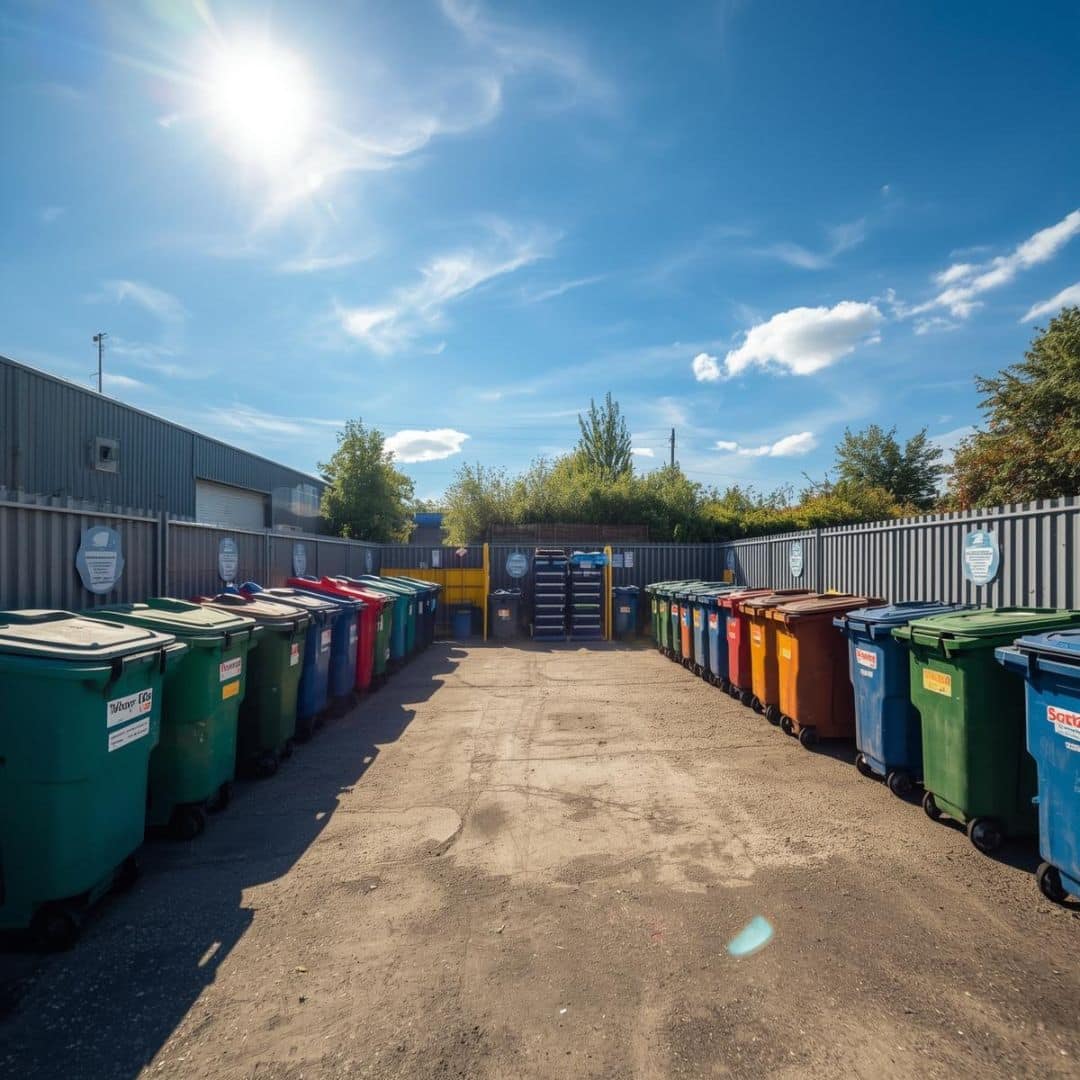
The Risk Of Waste Theft
When waste is stolen, the impact goes beyond inconvenience.
- Financial loss: Replacing bins, equipment, and stolen materials costs money.
- Environmental harm: Stolen waste is often dumped illegally, creating pollution and clean-up costs.
- Legal consequences: Under UK Duty of Care laws, your business remains responsible for waste even after it’s stolen.
- Data breaches: IT or telecoms waste can hold sensitive information, leaving you open to GDPR breaches.
- Reputational damage: Customers and regulators expect responsible waste management. A theft can raise unwanted questions about your controls.
Ultimately, waste theft isn’t just about losing assets. It’s about protecting your reputation and staying compliant with UK regulations.
How to Prevent Waste Theft
Preventing theft requires a mix of common sense and consistent management. Below are seven practical ways to protect your business from waste theft.
1. Use Secure Storage Areas
Store waste in a locked or fenced area at all times. A simple padlock or restricted gate access makes a big difference. Install motion lighting or CCTV cameras to deter opportunists.
If your waste area is in constant use, limit who has access. Give keys or codes only to trusted staff or contractors. Thieves prefer easy targets — visible security sends a strong message that your site is being monitored.
Additionally, try to place bins away from roads or entrances. The harder it is for a vehicle to pull up unnoticed, the safer your waste remains.
2. Schedule Regular Collections
Regular waste collections reduce risk by preventing build-up. Overflowing bins attract attention, and the longer waste sits on-site, the greater the chance of theft.
Set a collection schedule based on your business activity. For example, offices might benefit from weekly pickups, while industrial sites may need daily service.
At Pure Planet Recycling, we offer flexible collection slots to suit each customer. We also provide call-out services for one-off loads or urgent removals. The faster waste leaves your site, the safer it is.
3. Always Check Collection Credentials
Before allowing anyone to take your waste, always check who they are. Genuine recycling companies will never object to showing identification.
Ask for:
– The company name and vehicle registration.
– A valid Waste Carrier Licence.
– A Waste Transfer Note or Destruction Certificate, depending on what’s being collected.
Never assume that a uniform or logo means legitimacy. In one case, a site handed over equipment to an unverified collector who simply drove off. Checking paperwork takes seconds but prevents major problems later.
If something feels off, call your recycling partner directly before authorising a handover.
4. Work with Licensed Waste Carriers
A licensed waste carrier guarantees legal and secure handling of your materials. They follow strict Environmental Agency regulations, maintain records, and dispose of waste at authorised facilities.
Working with the right partner also means full traceability. You’ll receive proof that your waste was recycled or destroyed correctly, protecting your business from liability.
At Pure Planet Recycling, we hold all necessary licences as an Authorised Treatment Facility (ATF). Our customers rely on us for secure and compliant recycling across England.
5. Keep Records and Certificates
Paperwork might not seem exciting, but it’s essential. Keep copies of:
– Waste Transfer Notes
– Consignment Notes
– Certificates of Destruction (for data-bearing items)
These documents prove you acted responsibly and followed Duty of Care laws. If your waste ever ends up in the wrong place, this paperwork shows you used authorised collectors.
We provide certificates for all destruction and recycling services, giving you full accountability.
6. Train Your Staff
Your employees play a key role in preventing theft. Hold brief training sessions on how to manage waste safely and recognise suspicious activity.
Encourage staff to:
– Keep bins locked at all times.
– Report unplanned collections immediately.
– Challenge anyone collecting waste without notice.
When everyone understands their responsibilities, the whole site becomes more secure.
7. Mark or Label Your Bins
A simple deterrent is also one of the most effective. Mark each bin clearly with your business name and contact details. Engraving or heavy-duty vinyl labels make it obvious who the bins belong to.
Thieves are less likely to steal identifiable containers because they’re harder to sell or use elsewhere. If a bin does go missing, clear branding increases the chance of recovery.
For added protection, photograph your bins and serial numbers for reference.
For more detailed guidance on storing electrical waste safely, read our article How to Store Electrical Waste and Why Proper Storage Is Important.
What to Do If Your Waste Is Stolen
If you discover missing waste or bins, act quickly:
- Report the theft to your local council or waste contractor.
- Notify the Environment Agency if you suspect illegal dumping.
- Secure the site to prevent repeat incidents.
- Review CCTV or access logs.
- Update your collection schedule or procedures.
Quick action limits disruption and shows regulators that you take compliance seriously.
Final Thought
Waste theft might seem like a minor problem, but it can cause major headaches. As the value of materials rises, thieves are becoming faster and bolder.
However, you can stay one step ahead. By securing your bins, verifying every collection, and partnering with a trusted licensed carrier, you reduce your risk and protect your reputation.
At Pure Planet Recycling, we collect and recycle waste securely across mainland England. Whether you need WEEE recycling, fridge disposal, or data destruction, we handle everything with full compliance and transparency.
If you’re concerned about waste theft or want advice on secure collections, get in touch today.


